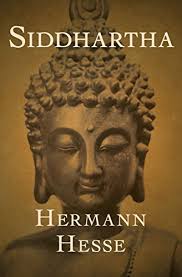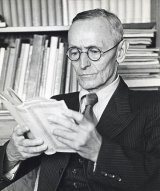Siddhartha Page #9
Siddhartha is a novel by Hermann Hesse that deals with the spiritual journey of self-discovery of a man named Siddhartha during the time of the Gautama Buddha. The book, Hesse's ninth novel, was written in German, in a simple, lyrical style.
In thinking this thoughts, Siddhartha stopped once again, suddenly, as if there was a snake lying in front of him on the path. Because suddenly, he had also become aware of this: He, who was indeed like someone who had just woken up or like a new-born baby, he had to start his life anew and start again at the very beginning. When he had left in this very morning from the grove Jetavana, the grove of that exalted one, already awakening, already on the path towards himself, he had every intention, regarded as natural and took for granted, that he, after years as an ascetic, would return to his home and his father. But now, only in this moment, when he stopped as if a snake was lying on his path, he also awoke to this realization: "But I am no longer the one I was, I am no ascetic any more, I am not a priest any more, I am no Brahman any more. Whatever should I do at home and at my father's place? Study? Make offerings? Practise meditation? But all this is over, all of this is no longer alongside my path." Motionless, Siddhartha remained standing there, and for the time of one moment and breath, his heart felt cold, he felt a cold in his chest, as a small animal, a bird or a rabbit, would when seeing how alone he was. For many years, he had been without home and had felt nothing. Now, he felt it. Still, even in the deepest meditation, he had been his father's son, had been a Brahman, of a high caste, a cleric. Now, he was nothing but Siddhartha, the awoken one, nothing else was left. Deeply, he inhaled, and for a moment, he felt cold and shivered. Nobody was thus alone as he was. There was no nobleman who did not belong to the noblemen, no worker that did not belong to the workers, and found refuge with them, shared their life, spoke their language. No Brahman, who would not be regarded as Brahmans and lived with them, no ascetic who would not find his refuge in the caste of the Samanas, and even the most forlorn hermit in the forest was not just one and alone, he was also surrounded by a place he belonged to, he also belonged to a caste, in which he was at home. Govinda had become a monk, and a thousand monks were his brothers, wore the same robe as he, believed in his faith, spoke his language. But he, Siddhartha, where did he belong to? With whom would he share his life? Whose language would he speak? Out of this moment, when the world melted away all around him, when he stood alone like a star in the sky, out of this moment of a cold and despair, Siddhartha emerged, more a self than before, more firmly concentrated. He felt: This had been the last tremor of the awakening, the last struggle of this birth. And it was not long until he walked again in long strides, started to proceed swiftly and impatiently, heading no longer for home, no longer to his father, no longer back. SECOND PART Dedicated to Wilhelm Gundert, my cousin in Japan KAMALA Siddhartha learned something new on every step of his path, for the world was transformed, and his heart was enchanted. He saw the sun rising over the mountains with their forests and setting over the distant beach with its palm-trees. At night, he saw the stars in the sky in their fixed positions and the crescent of the moon floating like a boat in the blue. He saw trees, stars, animals, clouds, rainbows, rocks, herbs, flowers, stream and river, the glistening dew in the bushes in the morning, distant high mountains which were blue and pale, birds sang and bees, wind silverishly blew through the rice-field. All of this, a thousand-fold and colourful, had always been there, always the sun and the moon had shone, always rivers had roared and bees had buzzed, but in former times all of this had been nothing more to Siddhartha than a fleeting, deceptive veil before his eyes, looked upon in distrust, destined to be penetrated and destroyed by thought, since it was not the essential existence, since this essence lay beyond, on the other side of, the visible. But now, his liberated eyes stayed on this side, he saw and became aware of the visible, sought to be at home in this world, did not search for the true essence, did not aim at a world beyond. Beautiful was this world, looking at it thus, without searching, thus simply, thus childlike. Beautiful were the moon and the stars, beautiful was the stream and the banks, the forest and the rocks, the goat and the gold-beetle, the flower and the butterfly. Beautiful and lovely it was, thus to walk through the world, thus childlike, thus awoken, thus open to what is near, thus without distrust. Differently the sun burnt the head, differently the shade of the forest cooled him down, differently the stream and the cistern, the pumpkin and the banana tasted. Short were the days, short the nights, every hour sped swiftly away like a sail on the sea, and under the sail was a ship full of treasures, full of joy. Siddhartha saw a group of apes moving through the high canopy of the forest, high in the branches, and heard their savage, greedy song. Siddhartha saw a male sheep following a female one and mating with her. In a lake of reeds, he saw the pike hungrily hunting for its dinner; propelling themselves away from it, in fear, wiggling and sparkling, the young fish jumped in droves out of the water; the scent of strength and passion came forcefully out of the hasty eddies of the water, which the pike stirred up, impetuously hunting. All of this had always existed, and he had not seen it; he had not been with it. Now he was with it, he was part of it. Light and shadow ran through his eyes, stars and moon ran through his heart. On the way, Siddhartha also remembered everything he had experienced in the Garden Jetavana, the teaching he had heard there, the divine Buddha, the farewell from Govinda, the conversation with the exalted one. Again he remembered his own words, he had spoken to the exalted one, every word, and with astonishment he became aware of the fact that there he had said things which he had not really known yet at this time. What he had said to Gotama: his, the Buddha's, treasure and secret was not the teachings, but the unexpressable and not teachable, which he had experienced in the hour of his enlightenment--it was nothing but this very thing which he had now gone to experience, what he now began to experience. Now, he had to experience his self. It is true that he had already known for a long time that his self was Atman, in its essence bearing the same eternal characteristics as Brahman. But never, he had really found this self, because he had wanted to capture it in the net of thought. With the body definitely not being the self, and not the spectacle of the senses, so it also was not the thought, not the rational mind, not the learned wisdom, not the learned ability to draw conclusions and to develop previous thoughts in to new ones. No, this world of thought was also still on this side, and nothing could be achieved by killing the random self of the senses, if the random self of thoughts and learned knowledge was fattened on the other hand. Both, the thoughts as well as the senses, were pretty things, the ultimate meaning was hidden behind both of them, both had to be listened to, both had to be played with, both neither had to be scorned nor overestimated, from both the secret voices of the innermost truth had to be attentively perceived. He wanted to strive for nothing, except for what the voice commanded him to strive for, dwell on nothing, except where the voice would advise him to do so. Why had Gotama, at that time, in the hour of all hours, sat down under the bo-tree, where the enlightenment hit him? He had heard a voice, a voice in his own heart, which had commanded him to seek rest under this tree, and he had neither preferred self-castigation, offerings, ablutions, nor prayer, neither food nor drink, neither sleep nor dream, he had obeyed the voice. To obey like this, not to an external command, only to the voice, to be ready like this, this was good, this was necessary, nothing else was necessary.
Translation
Translate and read this book in other languages:
Select another language:
- - Select -
- 简体中文 (Chinese - Simplified)
- 繁體中文 (Chinese - Traditional)
- Español (Spanish)
- Esperanto (Esperanto)
- 日本語 (Japanese)
- Português (Portuguese)
- Deutsch (German)
- العربية (Arabic)
- Français (French)
- Русский (Russian)
- ಕನ್ನಡ (Kannada)
- 한국어 (Korean)
- עברית (Hebrew)
- Gaeilge (Irish)
- Українська (Ukrainian)
- اردو (Urdu)
- Magyar (Hungarian)
- मानक हिन्दी (Hindi)
- Indonesia (Indonesian)
- Italiano (Italian)
- தமிழ் (Tamil)
- Türkçe (Turkish)
- తెలుగు (Telugu)
- ภาษาไทย (Thai)
- Tiếng Việt (Vietnamese)
- Čeština (Czech)
- Polski (Polish)
- Bahasa Indonesia (Indonesian)
- Românește (Romanian)
- Nederlands (Dutch)
- Ελληνικά (Greek)
- Latinum (Latin)
- Svenska (Swedish)
- Dansk (Danish)
- Suomi (Finnish)
- فارسی (Persian)
- ייִדיש (Yiddish)
- հայերեն (Armenian)
- Norsk (Norwegian)
- English (English)
Citation
Use the citation below to add this book to your bibliography:
Style:MLAChicagoAPA
"Siddhartha Books." Literature.com. STANDS4 LLC, 2024. Web. 23 Dec. 2024. <https://www.literature.com/book/siddhartha_24>.




Discuss this Siddhartha book with the community:
Report Comment
We're doing our best to make sure our content is useful, accurate and safe.
If by any chance you spot an inappropriate comment while navigating through our website please use this form to let us know, and we'll take care of it shortly.
Attachment
You need to be logged in to favorite.
Log In